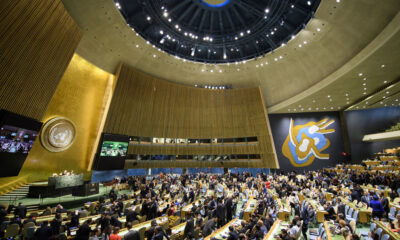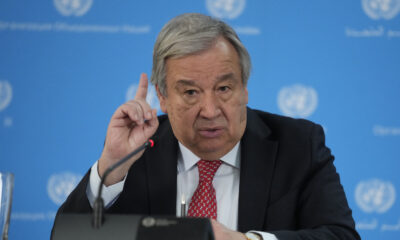News
US says Sudan warring factions agree to 72-hour ceasefire

US says Sudan warring factions agree to 72-hour ceasefire
The United States said on Monday that the warring factions in Sudan had agreed to a 72-hour ceasefire.
The truce is coming as Nigeria, Western, Arab and Asian nations raced to evacuate their citizens from the country.
The US Secretary of State, Anthony Blinken, said the deal followed two days of intense negotiations and would begin on Tuesday.
But there are doubts about the two sides honouring the agreement as they did not abide by several previous temporary truce deals.
The Nigerian government has promised to start evacuating Nigerians mostly students stranded in that country from Tuesday.
Air Peace has also volunteered to airlift the Nigerians provided they are moved to a neighbouring country.
Fighting erupted between the Sudan Armed Forces (SAF) and Rapid Support Forces (RSF) paramilitary group on April 15 and has killed at least 427 people, knocked out hospitals and other services, and turned residential areas into war zones.
“During this period, the United States urges the SAF and RSF to immediately and fully uphold the ceasefire,” Blinken said in a statement.
He said the U.S. would coordinate with regional, international and Sudanese civilian interests to create a committee that would oversee work on a permanent ceasefire and humanitarian arrangements.
The RSF confirmed in Khartoum that it had agreed to the ceasefire, starting at midnight, to facilitate humanitarian efforts.
“We affirm our commitment to a complete ceasefire during the truce period”, the RSF said.
The SAF did not immediately comment on the announcement.
A coalition of Sudanese civil society groups that had been part of negotiations on a transition to democracy welcomed the news.
Ahead of the evening truce announcement, air strikes and ground fighting shook Omdurman, one of three adjacent cities in the capital region, and there were also clashes in capital Khartoum, a Reuters reporter said.
Dark smoke enveloped the sky near the international airport in central Khartoum, adjacent to army headquarters, and booms of artillery fire rattled the surroundings.
U.N. Secretary-General Antonio Guterres said that the violence in a country that flanks the Red Sea, Horn of Africa and Sahel regions “risks a catastrophic conflagration … that could engulf the whole region and beyond”.
Tens of thousands of people, including Sudanese and citizens from neighbouring countries, have fled in the past few days, including to Egypt, Chad and South Sudan, despite instability and difficult living conditions there.
Foreign governments have been working to bring their nationals to safety. One 65-vehicle convoy took dozens of children, along with hundreds of diplomats and aid workers, on an 800-km (500-mile), 35-hour journey in searing heat from Khartoum to Port Sudan on the Red Sea.
For those remaining in Africa’s third-largest country, where a third of its 46 million people needed aid even before the violence, the situation was increasingly bleak.
There were acute shortages of food, clean water, medicines and fuel and limited communications and electricity, with prices skyrocketing, said deputy U.N. spokesperson Farhan Haq.
-With Reuters reports
News
Nigeria to reduce electricity supply to Niger Republic, Benin, Togo

Nigeria to reduce electricity supply to Niger Republic, Benin, Togo
The Nigerian Electricity Regulatory Commission (NERC) has ordered the System Operator (SO), a department in the Transmission Company of Nigeria (TCN) to commence the capping of power supply to cross-border customers in Benin Republic, Niger and Togo, in a bid to increase power availability to Nigerians.
This is coming as the Minister of Power, Adebayo Adelabu has disclosed that the federal government and the Nigerian Sovereign Investment Authority (NSIA) will make capital injections of N750 billion and N250 billion annual debt financing, respectively, to bride the huge electricity metering gap in the country that currently stands at about seven million.
In a document tagged: ‘Interim Order on Transmission System Dispatch Operations, Cross-border Supply and Related Matters’, the power sector regulator stated that the directive will last for six months in the first instance before review.
Nigeria supplies a portion of the electricity it generates to some of its neighbours, including the Benin Republic, Niger Republic, and Togo.
NERC’s order, dated April 29, 2024, and which became effective from May 1, 2024, was signed by the commission’s Chairman, Sanusi Garba, and Vice Chairman, Musiliu Oseni andIn the order, the regulatory agency directed that power delivery to Nigeria’s neighbours must not exceed six per cent of total grid electricity at any point in time.
The electricity sector regulator stressed that following the implementation of the April 2024 supplementary order, the commission had observed sub-optimal grid dispatch operation practices.
READ ALSO:
- Edo, Delta areas to experience two-week power outage – TCN
- Coastal highway project to disrupt DStv, GOtv services
- Former Minister of Education Gbagi dies at 62
It argued that this has compromised the Distribution Companies’ (Discos) ability to deliver on its Service Based Tariff (SBT) committed service levels to end-use customers with a significant impact on market revenues.NERC said the system operator’s sole reliance on limiting Discos’ load off-take/allocation in managing recurring grid imbalances while prioritising international off-takers and Eligible Customers (ECs) is neither efficient nor equitable.The practice so far adopted by the operator in managing generation availability, it said, has caused significant hardship to Discos’ customers, comprising industrial, commercial, and residential, especially during peak demands while prioritising delivery to other bilateral contracts, including export to international customers.
The commission noted that the current international and bilateral contracts with Generation Companies (Gencos) were based on best-endeavour and with loose terms that are often below the minimum contract standards currently operated in the industry.
It said many of the off-takers contracted bilaterally by Gencos often abuse this prioritisation and raise their off-takers during peak operations beyond their contracted levels at the expense of other grid users without attendant penalties for violation of grid instructions.
According to NERC, the order serves as an interim measure to guide the operations of the system operator and the TCN to implement Standard Operating Procedures (SOPs) to improve transparency and fairness of grid operations in delivering better services to all customers.It urged the system operator to place interim caps on capacities supplied to international customers for six months from the effective date of the order, thus minimising the displacement and impact on domestic supply obligations by Gencos.
“The commission hereby orders as follows: The system operator shall develop and present to the commission for approval within seven days from the issuance of this order a pro-rata load-shedding scheme that ensures equitable adjustment to load allocation to all off-takers — Discos, international customers, and eligible customers — in the event of a drop in generation and other under-frequency related grid imbalances necessitating critical grid management.
READ ALSO:
- Russia adds Zelensky to ‘wanted’ list of criminals
- Iheanacho eyes Aston Villa, turns down Leicester’s £65k weekly offer
- 1966 coup: Ohanaeze denies apology to Fulani
“The system operator shall implement a framework to log and publish hourly readings and enforce necessary sanctions for violation of grid instructions and contracted nominations by off-takers in line with the grid code and market,” it stated.Among others, it further directed that the system operator shall publish and notify all market participants and the commission of the previous day’s hourly log readings of off-take by market participants and the market settlements report by 12:00 noon of the next day.
“The system operator shall ensure that the maximum load allocation to international off-takers in each trading hour shall not be more than six per cent of the total available grid generation.
“The aggregate capacity that can be nominated by a generating plant to service international off-takers shall not be more than 10 per cent of its available generation capacity unless in exceptional circumstances a derogation is granted by the commission.
“The system operator shall henceforth cease to recognise any capacity addition in bilateral transactions between a generator and an off-taker without the express approval of the commission,” it added.
It urged the system operator and TCN to immediately initiate and install integrated Internet of Things (IoT) meters at all off-take and delivery points of eligible customers, bilateral supplies, cross-border trades, and outgoing 33kV feeders of the Discos to provide real-time visibility of aggregate offtake by grid customers.“The installation of and streaming of data from the IOT meters should be completed within three months from the date of this order,” it added.
Nigeria to reduce electricity supply to Niger Republic, Benin, Togo
(THISDAY)
News
Edo, Delta areas to experience two-week power outage – TCN

Edo, Delta areas to experience two-week power outage – TCN
The Transmission Company of Nigeria (TCN) has announced a two-week power outage starting on May 4 in parts of Edo and Delta states.
In a statement released in Benin by Ndidi Mbah, the General Manager of Public Affairs at TCN, it was revealed that the outage is necessary for the safe erection of two 132KV transmission towers at the Amukpe substation.
Benin DisCo will not receive bulk power supply during this period through several feeders, including Adeje, Industrial Woodland, Mosogar, Sapele, and Abraka.
“The Transmission Company of Nigeria (TCN), hereby states that it will commence the erection of two number 132kV transmission towers at its Amukpe Transmission Substation.
”And will equally restring a portion of the Benin-Delta and Delta-Oghara 132kV double circuit transmission lines from Saturday, May 4 to May 17, 2024.
READ ALSO:
- Coastal highway project to disrupt DStv, GOtv services
- Former Minister of Education Gbagi dies at 62
- Russia adds Zelensky to ‘wanted’ list of criminals
“Consequently, Amukpe Substation will be out of power for the work.
“Also, there will be no bulk power supply to Benin DisCo (BEDC) through the following feeders: the Adeje, industrial Woodland, Mosogar, Sapele and Abraka feeders.
“The outage is necessary to create a safe working environment for the contractor. Completion of the projects will establish N-1 redundancy, which would enable TCN to supply bulk electricity to the substation from either the Benin or Ughelli transmission line.
“This means that when one transmission line is faulty, bulk electricity can still be received in the substation from the second line,” Mbah said.
These developments, once completed, will ensure a more reliable and flexible bulk power supply through the Amukpe transmission substation.
It’s important to note that BEDC is responsible for the retail distribution of electricity in Delta, Edo, Ekiti, and Ondo States, covering an area of 57,353 square kilometres.
Edo, Delta areas to experience two-week power outage – TCN
News
Coastal highway project to disrupt DStv, GOtv services

Coastal highway project to disrupt DStv, GOtv services
DStv and GOtv customers in Nigeria have been notified to expect disruption in service from Sunday, May 5, to Tuesday, May 7, due to the ongoing construction project on the Lagos-Calabar Coastal Highway.
In a notice shared on social media on Friday, DStv assured customers that its technical team will be working to relocate its facility and minimise service disruptions during the process.
The statement read, “Our uplink facility will be impacted by the ongoing Lagos-Calabar Coastal Road construction project. As a result, we are forced to relocate.
READ ALSO:
- Former Minister of Education Gbagi dies at 62
- Russia adds Zelensky to ‘wanted’ list of criminals
- Iheanacho eyes Aston Villa, turns down Leicester’s £65k weekly offer
“From Sunday, May 5, 2024 to Tuesday May 7, 2024, our technical team will be working tirelessly to relocate and minimise disruptions during the exercise.
“We appreciate your patience and understanding during this period and remain dedicated to delivering the quality service and support you expect from DStv and GOtv.”
Recall that demolition for the 700km Lagos-Calabar Coastal Highway commenced on Monday.
According to the Minister of Works, David Umahi, the duration of the construction is eight years, and it will be constructed for N15 trillion.
Coastal highway project to disrupt DStv, GOtv services
-

 metro3 days ago
metro3 days agoSecurity forces, vigilantes arrest kidnapper terrorising communities in Kogi
-

 metro3 days ago
metro3 days ago19-year-old boy convicted for impregnating 14-year-old sister
-

 metro3 days ago
metro3 days agoThree ‘EFCC officials’ arrested for kidnapping, robbery in Nasarawa
-

 metro3 days ago
metro3 days agoBREAKING: EFCC, Cubana Chief Priest agree to settle out of court
-

 International2 days ago
International2 days agoUS students slam Biden’s comments on Gaza encampments
-

 Entertainment2 days ago
Entertainment2 days agoSanwo-Olu appoints KWAM1’S daughter as aide
-

 News2 days ago
News2 days agoI never said I’m a billionaire— Ex-Anambra CP
-

 News1 day ago
News1 day agoDon’t host US, French military bases in Nigeria, northern leaders warn Tinubu





















